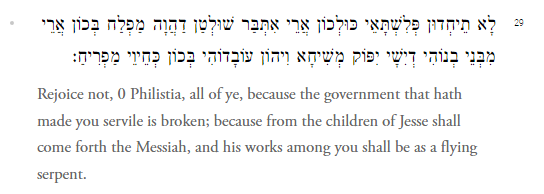Isaiah 11 seems to me to define the Messiah myth. Both for Christians, for whom it refers to Jesus, and for Jews who believe either in the Messiah of David, or in the 2 messiahs (of Joseph and of David). I can't see how to read it EXCEPT as referring to the Messiah.
Like others, I'm not sure why you mentioned the LXX, or exactly what your question is.
You are looking at Isa 1.1 and making a contrast between the two clauses. I'm sure that's a mistake. The two are parallel, and refer to the same figure. He is a shoot from a stump, and a branch from a root.
As the root is Jesse, most people think it refers to a descendant of David, who will be the Messiah. This is the most intuitive interpretation.
The Targum makes this intuition clear:
And a king shall come forth from the sons of Jesse, and from his
children's children the Messiah shall be anointed.
Note that the Targum, like you, assumes a king. I think it is reading choter as meaning staff or ruler, like the LXX ῥάβδος. (But I see no necessity to read it that way.) The reference to the Messiah is entirely inferred, of course. (Targum does that.)
Another way to interpret is that the expected Messiah will be David himself, redivivus. I'm sure that was one view. I believe there's yet another view that David will return and be the Messiah's lieutenant.
If your question meant "will the messiah be a divine figure or just an anointed king who will be a savior in war", ie. a human figure or a divine emanation, I think the answer is the latter. Look at the other place the term "root of Jesse" is used..
Isa 11:10 In that day the root of Jesse, who shall stand as a signal
for the peoples—of him shall the nations inquire, and his resting
place shall be glorious.
The word for inquire / seek is darash. It's never used of looking to a king or leader. Always to Yhwh, or a foreign god, or a necromancer, or a prophet. So there's no doubt. The Messiah is a kind of Divine figure of some sort.
Have a look at the LXX of that verse btw.
(LXX) καὶ ἔσται ἐν τῇ ἡμέρᾳ ἐκείνῃ ἡ ῥίζα τοῦ Ιεσσαι καὶ ὁ ἀνιστάμενος
ἄρχειν ἐθνῶν, ἐπ' αὐτῷ ἔθνη ἐλπιοῦσιν, Καὶ ἔσται ἡ ἀνάπαυσις αὐτοῦ
τιμή. (EngLXX) And in that day there shall be a root of Jesse, and he
that shall arise to rule over the Gentiles; in him shall the Gentiles
trust, and his rest shall be glorious.
It could mean rule, or lead, which is not quite what he Hebrew says. I do wonder if the LXX has been christianized. Rom 15.12 agrees with the LXX verbatim (lacking the final bit). Elpizw "expect" has connotations of Messianic expectations.
The Targum, btw, clearly thinks the Messiah is a descendant of David, not David himself.
And there shall be at that time a son of the son of Jesse, who shall
stand for an ensign of the people; kings shall obey him, and the place
of his dwelling shall be in glory. (1.10)
The word for ensign, btw, is nes. It inevitably connotes the serpent that was lifted up in the wilderness in Num 21.8. There the purpose was to heal the "bitten". But in Isaiah it clearly has the Messianic meaning of being a standard to which the remnants of Israel from all 4 corners of the earth will come to gather. Making a highway as they come.
This, btw, is how it is to be understood in the Didache. It gives us an insight into the meaning of the feeding of the 5,000, and of the Eucharist.
It's not important, btw, but I am pretty sure the Hebrew text of Isa 1.10 has lost something. It should say "a branch/shoot FROM the root of Jesse".
You should also look at Isa 14.29. There my translation says "from the serpent's root". Shoresh nachash. But it is clearly also referring to the Messiah. My Targum even translates it as "the root of Jesse", ie the Messiah. Because, of course, Nachash (or snake) is an alternative name of Jesse. Intriguing, no? My intuition, for which I have no support, is that the name Jesse was another word suggesting snake. 
The connection between the Messiah and the serpent that is lifted up is, in my view, fundamental. He is the saraph m'uph , the fiery serpent, or adder.
